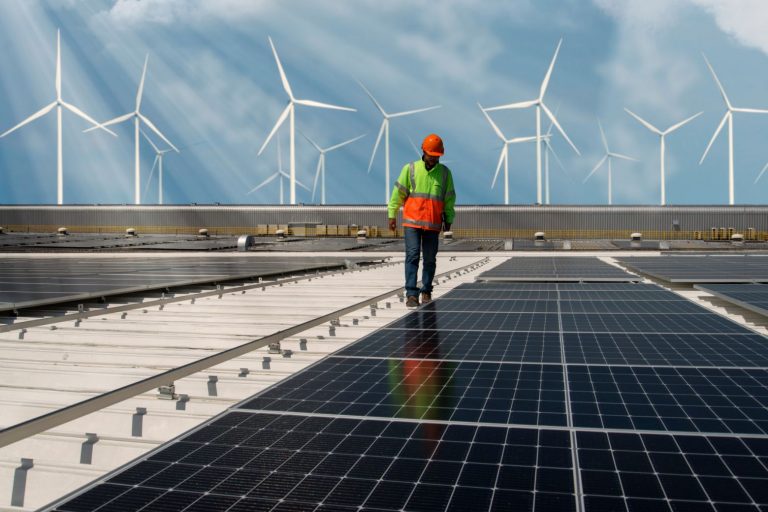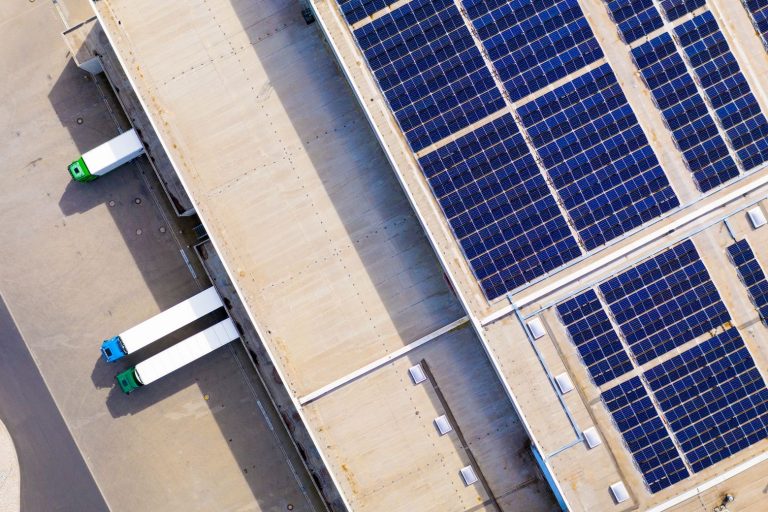Investment with success: financially and environmentally
The fund Branicks Renewables Europe enables a participation in an innovative Green Impact Investment.
By investing in this sustainable financial product, you as an institutional investor can become part of the transition to renewable energy sources and make an active contribution to society and the environment. This makes your investment not only economically, but also environmentally successful.
*Estimated value based on fund strategy assumptions;
equivalent to supplying around 373,400 households.
Photovoltaics
Onshore wind power
Related technologies
Compelling arguments in favour of ground-mounted PV plants include carbon-neutral power generation, high-cost effectiveness and virtually full recyclability. This well-established asset class represents an attractive investment not just because of its stable and predictable cashflows in combination with a comparatively low volatility but also due to its sustainability.
Onshore wind turbines belong among the most affordable types of sustainable energy production, and as a stable asset class they are a great way to diversify the fund portfolio. Generating more than one third of the total, wind energy accounts for the largest share of the gross sustainable electricity consumed within the European Union, and it is well established in both technological and economic terms.
EV charging points, rooftop PV plants and battery systems represent trending technologies that play an increasingly important role in the fight against climate change and for a sustainable energy supply. While EV charging points expedite the electrification of transportation and rooftop, PV plants permit the direct conversion of sunlight into electricity in already built-up areas, battery systems ensure the integration of renewable energies into the electricity grid.
“Increasing energy demand, combined with political regulation and growing awareness of sustainability issues, are driving steadily increasing and robust demand for renewable energy.”
– Torsten Doyen, Chief Institutional Business Officer (CIBO)
The predictability of generating power from freely-available energy sources, combined with low production costs and attractive electricity prices, provides an opportunity for profitable investments.
1 EU member states have yet to ratify the increase from 40 % to 42.5 % and 45 %.
2 European Environment Agency Data
3 German Federal Ministry for Economic Affairs and Climate Action
4 German Federal Statistical Office
Carbon neutral electricity generation contributes significantly to the effort to achieve today’s climate policy goals. The recyclability of photovoltaics equipment is close to 100 %, making the plants a major part within a sustainable circular economy. Renewable energies also serve a social purpose because they represent a cost-effective source of electricity while also reducing political dependence and cushioning the price shocks to which fossil energy sources are prone.
To reduce greenhouse gas emissions in EU countries by at least 55 % by 2030, the European Council decided in 2023 to increase the target for renewable energy sources to 42.5 % of energy consumption.1
Significant investments are required to achieve this target. In 2022 the share of renewables in the EU was 22.5 %. An in-crease of around 89 % is therefore required by 2030 to meet the EU’s climate target.2
Electricity demand is set to rise by more than a third by 2030, due in particular to digitalisation and the electrification of transport and heating.3
This trend is set against a decline in electricity production resulting from the phasing out of fossil fuels and nuclear energy (-11.3 % between 2017 and 2022).4
The preference for sourcing “green electricity”, coupled with a sharp rise in electricity demand, is creating a positive trend in market prices. Attractive electricity prices can be secured over a long period of time by using long-term electricity marketing agreements. The predictability of generating power from freely-available energy sources, combined with low production costs and attractive electricity prices, provides an opportunity for profitable investments.
Economies of scale can be exploited by allocating large-volume projects that have a positive impact on the pants’ construction and operating costs. An investment in renewable energy is especially suitable for portfolio diversification due to its low correlation with other asset classes.
“There is a tremendous need for investment in renewables in Europe and Germany from both an economic and an environmental perspective.”
– Eva Stegmayer, Managing Director Business Development
Legal Note
Branicks Institutional Investment Advisory GmbH, a subsidiary of Branicks Group AG, provides its services in the investment brokerage of financial instruments within the meaning of Section 2 (2) No. 3 of the German Securities Institutions Act („WpIG“) as a tied agent exclusively for the account and under the liability of AHP Capital Management GmbH, Weißfrauenstraße 12-16, 60311 Frankfurt am Main.

